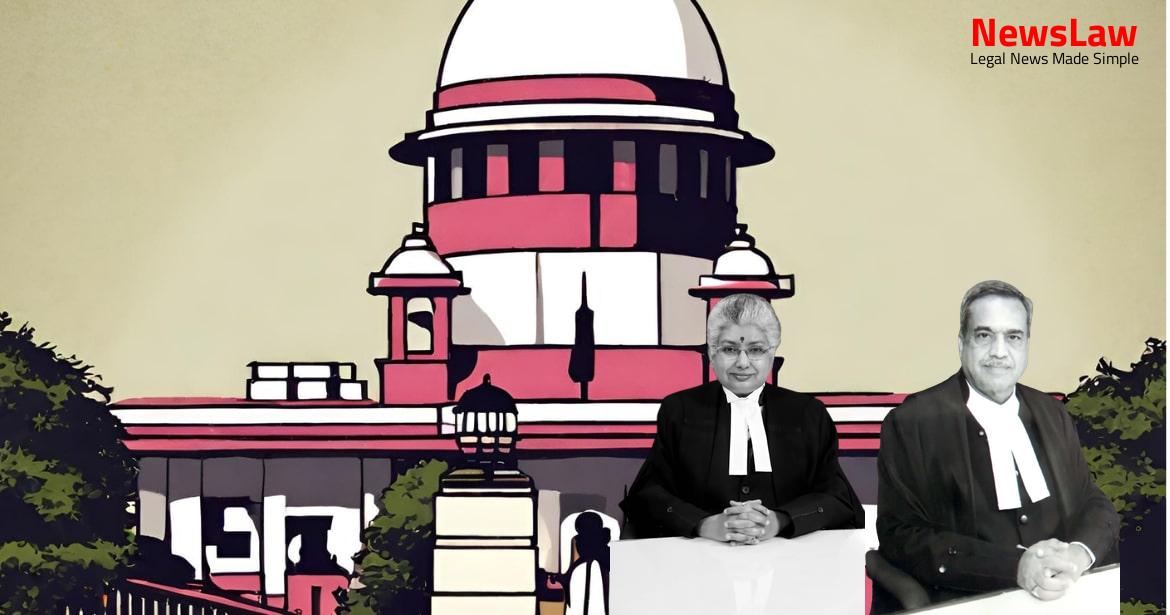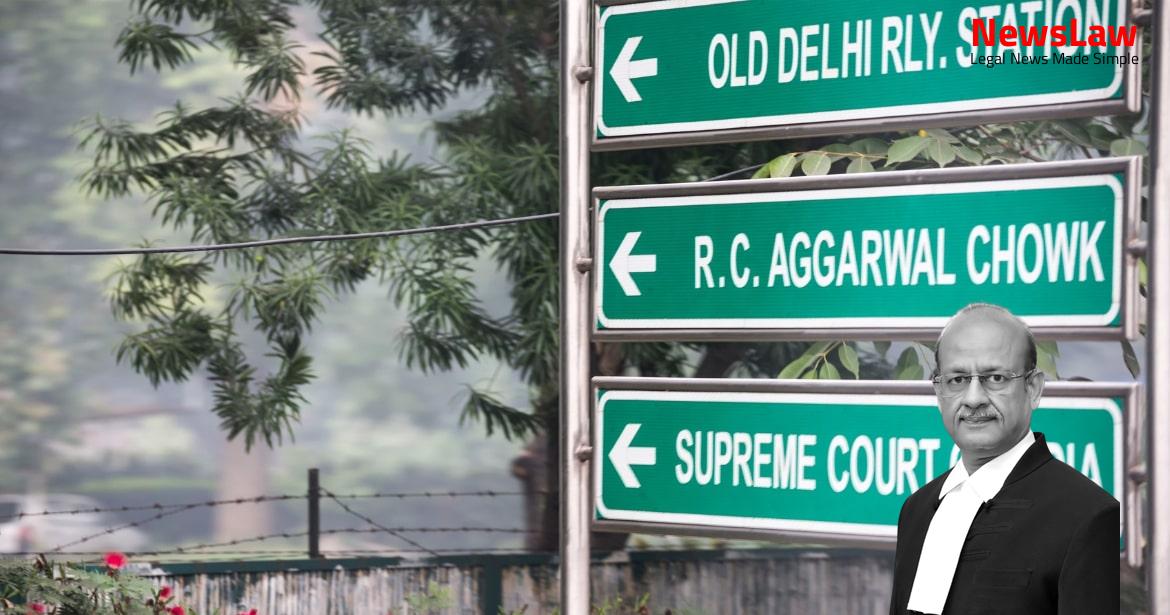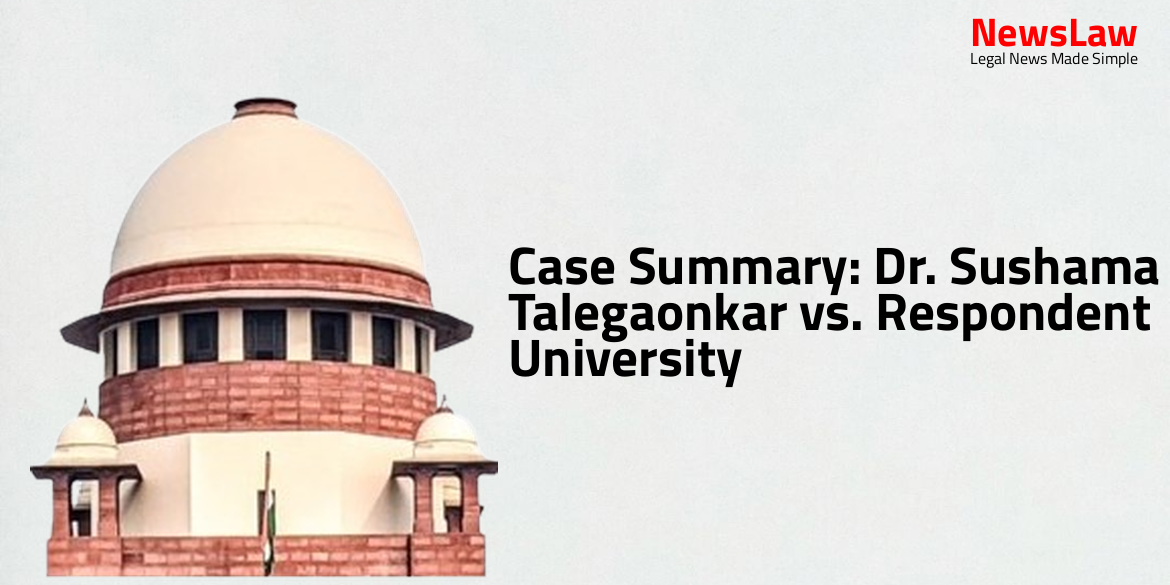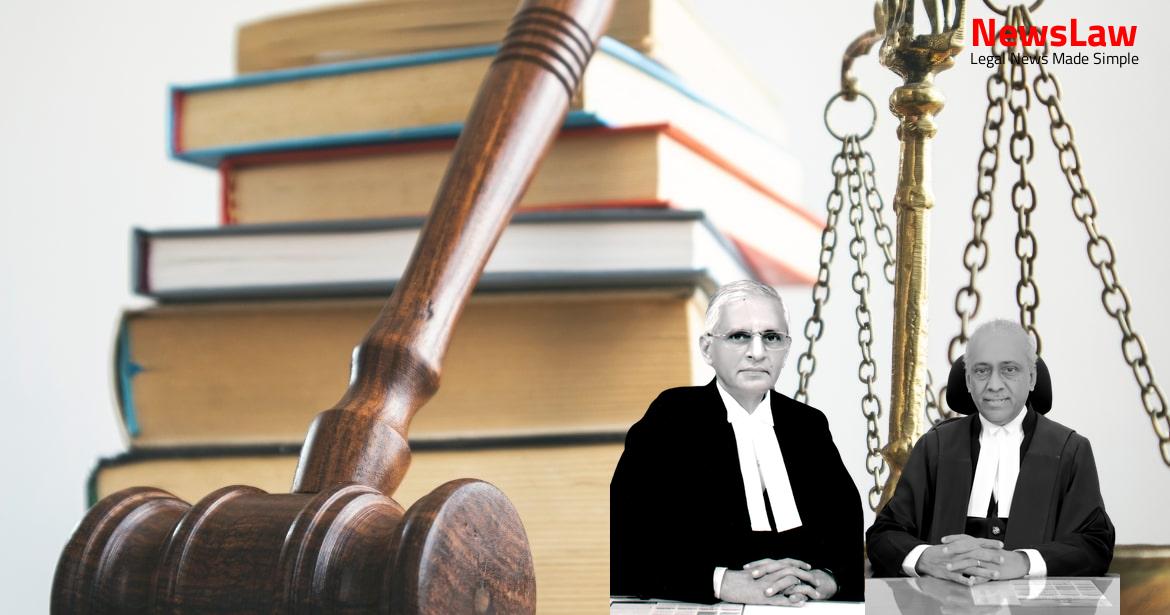Explore the dynamic legal intricacies of the court’s analysis on the abatement of appeals in cases involving the absence of legal representatives for deceased parties. The court’s detailed examination of Order 22 CPC and the consequences of failing to substitute legal heirs sheds light on the complexities of joint decrees, jurisdictional defects, and the importance of maintaining all necessary parties for a fair appeal process. Dive into the legal labyrinth with us!
Facts
- DDA failed to bring on record the legal representatives of many respondents who died.
- Original plaintiff no.1 and LRs of plaintiff no.2 and defendant no.8 were recorded as respondents in the appeal.
- The suit was dismissed for non-prosecution but later restored.
- Several respondents, including the original purchasers of the lands and their heirs, died.
- The original plaintiff no.1 also passed away.
- The suit was filed challenging the acquisition proceedings under the Land Acquisition Act.
- Central Government made policy decisions regarding the release of certain lands from acquisition.
- Notification under Section 4 of the Land Acquisition Act was issued in 1964.
- A decree of permanent injunction was passed by the Trial Court.
- Substitution of legal heirs occurred for deceased parties.
- Various representations were made regarding the release of land.
- Deeds of Conveyance were executed for the land parcels.
- Judgment decreed in favor of the plaintiffs declaring the notifications under Sections 4 & 6 of the Act null and void.
- Contesting defendants were restrained from dispossessing the plaintiffs and other co-owners of the land.
- Despite jurisdictional issues, the suit was decreed by the Trial Court.
- Appellant DDA appealed the Trial Court decision.
- Legal complexities arose due to the deaths of respondents and plaintiffs involved in the case.
- DDA filed Review Petition No.314 of 2008 seeking review of the order dated 09.07.2007
- High Court issued notice on 03.09.2008 which remained unserved till the decision in the impugned order dated 13.01.2012
- Division Bench of the High Court dismissed the entire appeal as having abated due to failure to bring Legal Representatives on record for deceased respondents
- High Court in the impugned order dated 13.01.2012 dismissed the review application and refused to recall the order dated 09.07.2007
- Opportunities were given for the substitution of Legal Representatives but the review application was still dismissed
- Original order dated 09.07.2007 and subsequent order dated 13.01.2012 are the subject matter of the present appeals
Also Read: Challenging Legal Presumptions in Negotiable Instrument Cases
Issue
- The effect of Letter dated 10.01.1967 and February, 1968 filed as Annexure D and G to the Plaint was discussed.
- The question of whether the defendants withdrew from the acquisition proceedings was raised.
- Initially, four issues were framed by the Trial Court related to the legality of the notification dated 16.01.1969 under Section 6 of the Land Acquisition Act.
- An additional preliminary issue was framed on 12.12.1995 to determine whether the Civil Court had jurisdiction to review the validity of the notification under Section 4 and 6 of the Land Acquisition Act.
Also Read: Legal Analysis of Admission Irregularities in Educational Institutions
Arguments
- The appellant argues that the appeal should not be treated as abated solely on the ground of not substituting the legal representatives of certain respondents.
- The appellant cites Order 22 Rule 4(4) of the CPC and emphasizes that the deceased respondents who did not file a written statement or appear in court were not necessary parties for the appeal.
- Reference is made to previous court decisions, such as Mata Prasad Mathur vs Jawala Prasad Mathur and A. Viswanatha Pilliai vs The Special Tehsildar for Land Acquisition No.4, to support the assertion that one co-owner can represent the legal interests of other co-owners.
- The appellant contends that if the entire estate is represented in the suit, it is deemed to be represented in the appeal as well.
- The High Court is criticized for dismissing the appeal as abated without considering whether the presence of the respondents’ legal representatives was necessary.
- The appellant argues for the appeal to be heard on its merits, especially when the acquired land is for public purpose, and emphasizes the need for a time-bound resolution.
- The issue of conflicting decrees due to the failure to bring all legal representatives on record is raised, highlighting the case as a ‘joint and indivisible decree’.
- Jagdish Anand was one of the legal representatives of original plaintiff no.2 and defendant no.8 out of the 10.
- The review petition before the High Court was barred by limitation by 378 days.
- Plaintiffs 1 & 2 along with others were migrants from Lahore, Pakistan.
- Decree dated 12.01.2000 will be in favor of the legal representatives of all the deceased respondents, leading to potential conflicting decrees if the appeal succeeds.
- There were two deeds of conveyance in respect of the entire land in favor of six owners without demarcating their shares.
- Co-owners or their heirs were owners of the entire land collectively, not exclusively owning specific portions.
- One co-owner can file a suit to recover property against a stranger for the benefit of all co-owners.
- Permanent injunction was granted in favor of the plaintiffs and co-sharers against land acquisition authorities and the DDA.
- Enforcement of the decree without legal representatives of deceased respondents may lead to conflicting decrees.
- Other legal representatives are already on record and can proceed with the appeals.
- High Court decision to dismiss the appeal as abated is supported by legal precedents.
- Various judgments of the court are cited in support of the dismissal of the appeals.
Also Read: Legal Analysis: Driver Appointment Dispute
Analysis
- The High Court dismissed the appeal on the grounds of abatement due to failure to bring on record the legal representatives of deceased respondents.
- The delay in challenging the original order dated 09.07.2007 was justified as the appellant was prosecuting a review application filed in 2008.
- The court discussed the principles of abatement under Order 22 CPC and emphasized the importance of bringing legal representatives on record in case of deceased parties.
- The decision to dismiss the appeal as abated was based on the failure to substitute the legal representatives of the deceased respondents.
- The court elaborated on the consequences of abatement in joint decrees and the necessity of maintaining all necessary parties for a proper appeal.
- The dismissal of the appeal against the deceased respondents made their decree final and unmodifiable, affecting the joint owners’ rights and interests.
- The court clarified that appeals against co-respondents do not abate automatically due to the abatement of an appeal against a deceased respondent.
- The time taken in prosecuting the review application was excluded from the delay in challenging the original order dated 09.07.2007, allowing the appeal to be considered on merit.
- In the case of Nathu Ram, the Court explained the effect of abatement on joint and indivisible decrees.
- Abatement against a deceased respondent results in the decree between the appellant and the deceased respondent becoming final.
- The Court cannot modify the decree in any way after abatement takes place.
- The decision on abatement depends on whether the decree obtained was joint or separate.
- Abatement may also apply to co-respondents under certain circumstances.
- The Court emphasized that the defect of jurisdiction in a decree can be questioned at any stage, including during execution.
- Jurisdictional defects cannot be cured by consent of the parties.
- The Court referred back to the Nathu Ram case to highlight the abatement rules under Order 22 Rule 4 of the Civil Procedure Code.
- The plaintiffs prayed for various reliefs regarding the land acquisition proceedings under Section 5A of the Land Acquisition Act.
- In case of death of an appellant or respondent, the appeal does not abate if the right to sue survives.
- Rules under Order 22 of the Code outline procedures in case of death of plaintiffs, defendants, appellants, or respondents.
- The Court must make an entry if the right to sue survives to the surviving party, and the case should proceed accordingly.
- If the right to sue does not survive against the surviving party, the legal representative of the deceased party should be made a party in the case.
- Failure to bring the legal representatives may result in abatement of the suit or appeal against the deceased party.
- The appellant, DDA, argued that the judgment and decree passed by the Trial Court were null and without jurisdiction.
- Question arises on whether the appeal abates if the original plaintiffs are on record and the decree is found to be a nullity.
- If the decree is determined to be null and without jurisdiction, it will be considered null for all purposes.
Decision
- Consequences of not bringing the legal representatives of deceased respondents/defendants during appeal need to be determined.
- The right to sue against original plaintiffs and/or surviving respondents/defendants must be considered.
- The High Court’s failure to consider these aspects led to the success of both appeals.
- The impugned judgment of the High Court dismissing the appeal for abatement is set aside.
- High Court instructed to reconsider the appeal, conduct an inquiry on the survival of the right to sue against remaining respondents, and take into account the representation of the estate by surviving parties.
- The present appeals are allowed with the above observations.
Case Title: DELHI DEVELOPMENT AUTHORITY Vs. DIWAN CHAND ANAND . (2022 INSC 668)
Case Number: C.A. No.-002397-002397 / 2022



